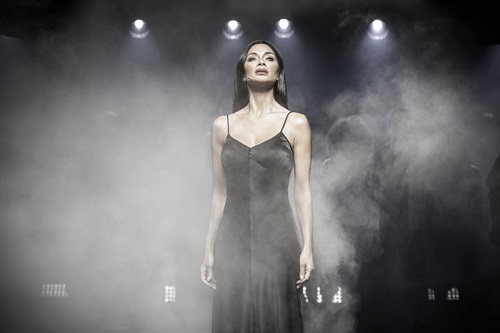NYC News
Nicole Scherzinger Kills It In Sunset Boulevard
October 20, 2024, 10:35.30 pm ET

Photo: Marc Brenner
By Brian Scott Lipton
We’re back to that famed boulevard of broken dreams but things look very different today on “Sunset Boulevard” (now at the St. James Theatre) than they did in the last two Broadway incarnations of this famed musical adapted from Billy Wilder’s legendary 1950 film. Indeed, in British director Jamie Lloyd’s, super-stripped-down production, gone are the grand staircase, the lavish costumes, or any notion the physical sense of Old Hollywood that dominated Trevor Nunn’s 1994 production.
In fact, there’s nothing to look at here except the faces of this production’s players – most notably, the amazing Nicole Scherzinger in a killer performance as silent movie goddess Norma Desmond and the equally great Tom Francis as her eventual paramour, the money-hungry screenwriter Joe Gillis -- often blown-up to larger-than-life proportions via live capture projections (by Nathan Amzi and Joe Ransom).
And these two stars do, to quote the script, have faces. And voices. And presence. A singer of phenomenal power and range, Scherzinger hits and holds the notes written by Andrew Lloyd Webber in a way that can induce gasps (not to mention two mid-show standing ovations at my performance). Better yet, she also brings an incredible intentionality to the song’s lyrics (by Christopher Hampton and Don Black) as if she’s thought for years about the meaning of every single word that comes out of her mouth, especially in her showstoppers “With One Look” and “As If We Never Said Goodbye.”
Incredibly lithe and youthful looking in a simple black slip, Scherzinger has a bit of a challenge in creating Norma’s character arc. She’s no aged, faded beauty, but since she’s clearly been discarded by Hollywood (as many were during the age of talking pictures), it’s understandable that she has literally gone a bit stir-crazy in her Hollywood mansion, with only her pet monkey (who dies as the show begins) and her “servant” Max (a brilliantly menacing David Thaxton) for company.
Furthermore, it’s not clear she remembers Max was both her first director and her first ex-husband. Moreover, she absolutely doesn’t realize that he’s been writing all the fan mail that has convinced her that she is still “the greatest star of all.” She’s both deluded and delusional. And if Max understands what shattering those illusions will do to her, Joe ultimately doesn’t, leading to the show’s tragic ending.
Still, the movie-star handsome Joe is a victim, in more ways than one. While his meeting with Norma is literally accidental, everything he does afterwards is purposeful, as he decides to be her co-writer and then lover in exchange for everything money can buy – a deal which makes practical sense after one’s car has been repossessed and the studios ignore your work. It’s only when Joe falls for studio gal Betty Schaefer (a remarkably un-saccharine Grace Hodgett Young) -- in what has always been a less-than-believable “insta-romance” -- that decisions must be made (even if they come with unforeseen consequences).
Speaking of decisions, I can’t understand why Lloyd insists on having Act 2 open with Francis walking down many flights of stairs from his dressing room (meeting many cast members who simply mug for the camera) and then going out into busy Shubert Alley while singing the unimpressive title song, which Francis belts with gusto and angst in equal measure. A truly committed actor, Francis never loses focus and returns to the stage triumphantly, but it’s a pointless (and potentially dangerous) party trick, which also takes one out of the show for no good reason.
Some of Lloyd’s other decisions are equally questionable, including opting for an oddly, too-contemporary costumed ensemble (by Soutra Gilmour) that is more distracting than illuminating (even if I loudly applaud the concept of everyone being dressed in black and white.) Other choices are smart ones, such as having the mayhem of Hollywood savvily represented by the inventive choreography by the talented Fabian Aloise or cutting a couple of the score’s lesser songs. Above all, his “staging” of the show’s final moments is remarkably effective.
Ultimately, Lloyd may not actually give us new ways to dream (although nightmares are not out of the question). But he does give us many good reasons to take a trip to “Sunset Boulevard.”
SEE DETAILS/TICKETS
LATEST NYC NEWS

Inside NYC’s New Indian Wedding-Inspired Restaurant
March 31, 2025, 11:03 am ET
We had the chance to experience Madam Ji Ki Shaadi firsthand — the brand-new immersive Indian wedding-themed restaurant that just opened in Greenwich Village (154 Bleecker St). From the moment... READ MORE

Scenes from Tulip Day 2025 in NYC
March 31, 2025, 9:20 am ET
Union Square Park became a parade of colors as 170,000 tulips went on display (and later picked) on Tulip Day 2025. Here are some of our favorite pictures from photographer Thomas Sayegh. ... READ MORE

The Forecast is Bright for NYC’s Cloudy Donuts
March 30, 2025, 9:28 am ET
New Yorkers lined up in the early-morning chill this past Saturday to get their hands on a limited batch of what some are calling “the best vegan donuts on Earth.” The scene? A sugary po... READ MORE


 Sign up for our newsletter !
Sign up for our newsletter !